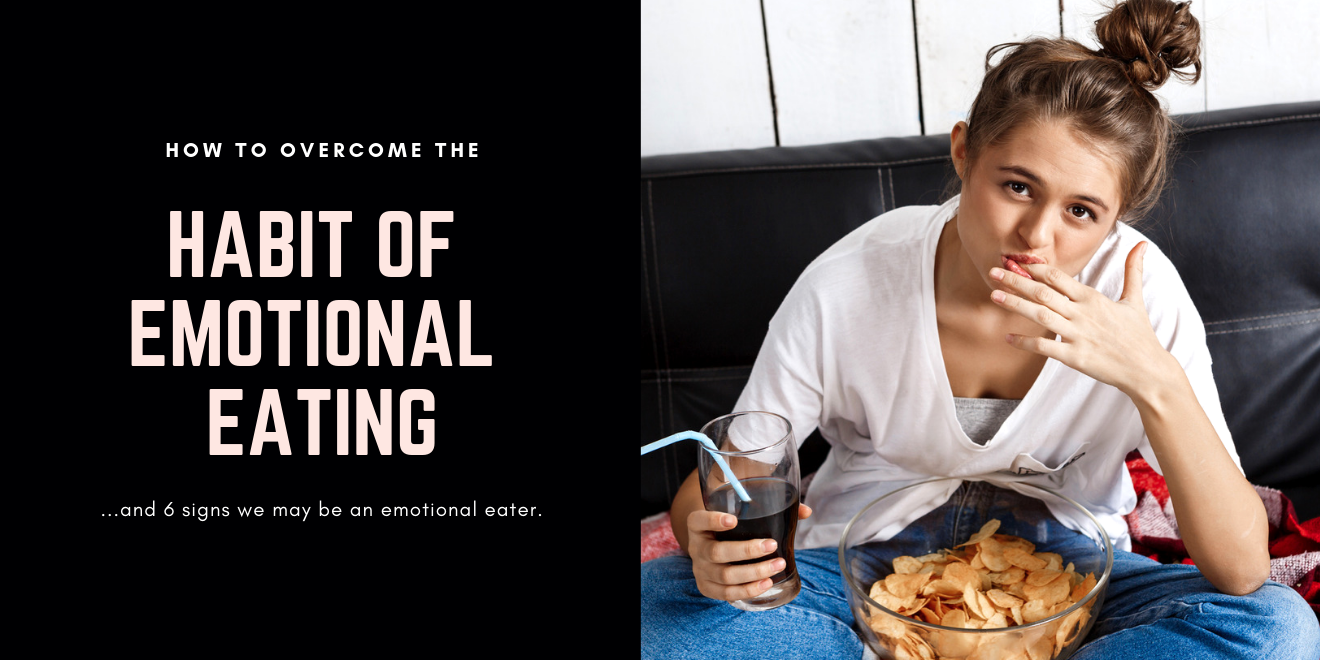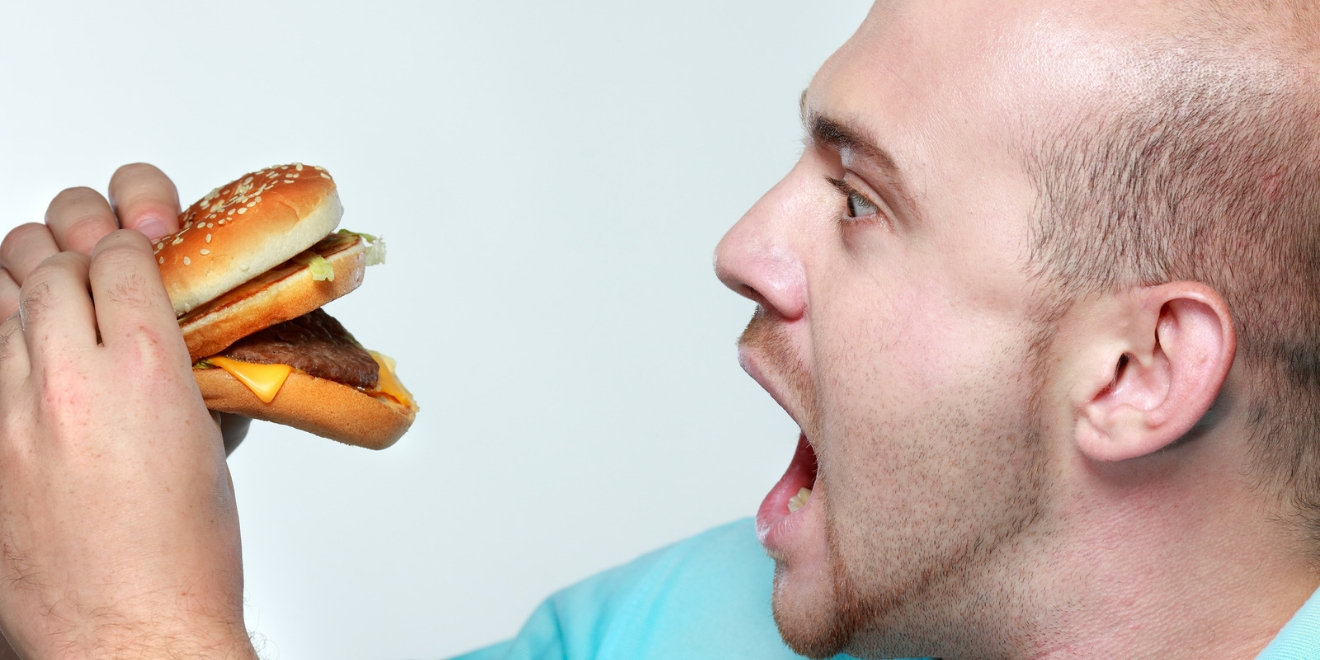How to Overcome the Habit of Emotional Eating

Many of us are familiar with the concept of emotional eating.
We've heard it somewhere, though that doesn't apply to me, and moved on. But we are left thinking to ourselves one question over and over, what is Comfort Eating (really)?

For many, food is closely associated with emotion. It's used to celebrate, to mourn, and to entertain. As such, more people than ever are being faced with an emotional eating disorder, also known as a comfort eating disorder.
At its core, a comfort eating disorder is a habit where a person turns to food for just that: comfort. You might eat when you feel happy, sad, lonely, or some other emotion that your body feels the need to supplement with food. While extremely common, comfort eating has a tremendous potential to negatively impact your health.
Do you find yourself reaching for food when your mood changes? If you catch yourself regularly heading into the kitchen when you get good news, bad news, or simply find yourself feeling bored, lonely, sad, or even happy, you likely have a comforting eating issue. Many people get into the habit of comfort eating simply because of how they were raised and because of the norms of our society where food finds its way into just about every event and occasion, usually as an integral part of it.
Obviously, overeating is among one of the biggest risks you'll face if you are a comfort eater. Some other side effects that can come along with comfort eating habits are severe eating disorders, where you may begin binge eating or go through phases of radical dieting attempting to counteract your emotional overeating. None of these things are healthy, and a medical professional can assist you in overcoming them.
https://www.youtube.com/watch?v=wKSUZrLZrdY
Another bad thing about comfort eating is that, usually, the “comfort foods” people turn to are far from healthy. Mainly, they are empty calories and tend to be high in sugar.
"Intuitive eating" is a practice most healthcare professionals recommend that everyone adapts to. With intuitive eating, you'll check in with yourself before taking a bite of anything. The goal is to only eat when you feel hungry. Otherwise, you put the food down, drink some water, and busy yourself with something else. It can be a struggle at first as you break away from your comfort eating habits, but gradually you will find yourself adapting to this new approach.
In a matter of time, your intuitive eating habit will enable you to turn down food when you aren't hungry and stop eating simply out of boredom or emotion. This prevents overeating and generally leads to a healthier lifestyle.
Are you wondering if you may be in the habit of emotional or comfort eating?
Here are 6 behavioral signs that accompany this bad tendency.
If you find yourself reaching for food when you have work, study, or exams on your mind, you may end up grabbing a snack subconsciously just to keep yourself busy, and somewhat distract/comfort yourself, as you work.
Have you ever went to the kitchen when you suddenly felt anxious, tired, bored, empty, lonely, disappointed, say, annoyed, angry, or even happy or relieved? If so, you are using food to supplement your feelings.

Burying yourself under a bowl of ice cream or a slice of cake in an effort to comfort yourself or seek solace from your feelings is not a good habit to be in and it can quickly lead to overeating.
If you have found yourself going into the kitchen and eating anyways even if you already know that you aren't truly hungry, that means you are eating just for your emotions and not for your physical body.
Let's say you can control yourself and you don't always give in to the urge to eat when you aren't hungry. Even so, when food comes to mind at times where you are rightfully full, that's a sign that you are an emotional eater.
These cravings may be completely random, and stem from boredom/depression, or they could be tied to a thought process or feeling you experienced without really realizing. For example, you might begin craving cake once you realize you have nothing left to do for a while.
These are not all of the behavioral signs associated with emotional eating, but if you experience any of these, you are likely an emotional eater and that’s something worth addressing. In the meantime, however, here are a few practical techniques to curb the habit of overeating.
Stress is tightly linked to overeating. While, in the short-term, stress can actually cause you to lose your appetite, prolonged stress will lead to the release of cortisol within your system that will greatly increase your appetite and lead to increased motivation...including an increased motivation to eat.

This hormone can completely throw your diet for a loop, and that's why managing stress is often the best way to get to the root of your overheating problem. Here are five techniques to help you do it.
Being able to manage your time better, plan ahead, and know what's coming are all important to managing and reducing your stress. Creating a schedule with a day planner and sticking to it, then reviewing it periodically, is the simple secret to feeling like you have control over your days again.
Do you have a lot on your plate? Learning to say no to new projects is important to prevent overwhelm. When you stretch yourself too thin for too long, you're just going to end up letting people down at the last minute. Instead of feeling pressured to take on things that you can't handle, look at your schedule and decide if you can do it or not--and when.
When it comes time to work, you can lower your stress by using any number of productivity-boosting tactics. The Pomodoro method , for instance, uses a timer to help you break a long list of to-dos up into short 25-minute work increments. Each bout is separated by a brief 5 minutes break, and then you get one longer break to enjoy after you've worked for a few sessions.

Until you're able to take a sigh of relief and officially mark things as completed in your calendar, learning how to breathe can help you get through a whole host of situations without losing your cool. Practice breathing methods to improve your mindfulness and keep you centered and focused in the moment when it matters.
Are you overworked? Burning the candle at both ends won't get you very far for too long. Instead of thinking that you are alone in dealing with your stress, think about the resources you have to lighten your load and get assistance, whether it's asking for a deadline extension or asking for a friend to talk to.
https://www.youtube.com/watch?v=8bE5XLGNPF0
We've heard it somewhere, though that doesn't apply to me, and moved on. But we are left thinking to ourselves one question over and over, what is Comfort Eating (really)?

For many, food is closely associated with emotion. It's used to celebrate, to mourn, and to entertain. As such, more people than ever are being faced with an emotional eating disorder, also known as a comfort eating disorder.
At its core, a comfort eating disorder is a habit where a person turns to food for just that: comfort. You might eat when you feel happy, sad, lonely, or some other emotion that your body feels the need to supplement with food. While extremely common, comfort eating has a tremendous potential to negatively impact your health.
How to Identify Comfort Eating
Do you find yourself reaching for food when your mood changes? If you catch yourself regularly heading into the kitchen when you get good news, bad news, or simply find yourself feeling bored, lonely, sad, or even happy, you likely have a comforting eating issue. Many people get into the habit of comfort eating simply because of how they were raised and because of the norms of our society where food finds its way into just about every event and occasion, usually as an integral part of it.
A few of the Dangers of Comfort Eating
Obviously, overeating is among one of the biggest risks you'll face if you are a comfort eater. Some other side effects that can come along with comfort eating habits are severe eating disorders, where you may begin binge eating or go through phases of radical dieting attempting to counteract your emotional overeating. None of these things are healthy, and a medical professional can assist you in overcoming them.
https://www.youtube.com/watch?v=wKSUZrLZrdY
Another bad thing about comfort eating is that, usually, the “comfort foods” people turn to are far from healthy. Mainly, they are empty calories and tend to be high in sugar.
How to Overcome the Habit of Emotional Eating
"Intuitive eating" is a practice most healthcare professionals recommend that everyone adapts to. With intuitive eating, you'll check in with yourself before taking a bite of anything. The goal is to only eat when you feel hungry. Otherwise, you put the food down, drink some water, and busy yourself with something else. It can be a struggle at first as you break away from your comfort eating habits, but gradually you will find yourself adapting to this new approach.
In a matter of time, your intuitive eating habit will enable you to turn down food when you aren't hungry and stop eating simply out of boredom or emotion. This prevents overeating and generally leads to a healthier lifestyle.
Are you wondering if you may be in the habit of emotional or comfort eating?
Here are 6 behavioral signs that accompany this bad tendency.
6 Behavioral Signs that You May Be An Emotional Eater
1. If you eat when you're stressed out , that means you are an emotional eater.
If you find yourself reaching for food when you have work, study, or exams on your mind, you may end up grabbing a snack subconsciously just to keep yourself busy, and somewhat distract/comfort yourself, as you work.
2. If you eat when you have a strong emotion , that means you are an emotional eater.
Have you ever went to the kitchen when you suddenly felt anxious, tired, bored, empty, lonely, disappointed, say, annoyed, angry, or even happy or relieved? If so, you are using food to supplement your feelings.

3. If you eat when you feel down , that means you are an emotional eater.
Burying yourself under a bowl of ice cream or a slice of cake in an effort to comfort yourself or seek solace from your feelings is not a good habit to be in and it can quickly lead to overeating.
4. If you can't stop yourself from eating , that means you are an emotional eater.
If you have found yourself going into the kitchen and eating anyways even if you already know that you aren't truly hungry, that means you are eating just for your emotions and not for your physical body.
5. If you think about eating even when you aren't hungry , that means you are an emotional eater.
Let's say you can control yourself and you don't always give in to the urge to eat when you aren't hungry. Even so, when food comes to mind at times where you are rightfully full, that's a sign that you are an emotional eater.
6. If you get random cravings for food out of the blue , that means you are an emotional eater.
These cravings may be completely random, and stem from boredom/depression, or they could be tied to a thought process or feeling you experienced without really realizing. For example, you might begin craving cake once you realize you have nothing left to do for a while.
These are not all of the behavioral signs associated with emotional eating, but if you experience any of these, you are likely an emotional eater and that’s something worth addressing. In the meantime, however, here are a few practical techniques to curb the habit of overeating.
5 Stress Relief Techniques to Help Avoid Overeating
Stress is tightly linked to overeating. While, in the short-term, stress can actually cause you to lose your appetite, prolonged stress will lead to the release of cortisol within your system that will greatly increase your appetite and lead to increased motivation...including an increased motivation to eat.

This hormone can completely throw your diet for a loop, and that's why managing stress is often the best way to get to the root of your overheating problem. Here are five techniques to help you do it.
#1 Create A Schedule
Being able to manage your time better, plan ahead, and know what's coming are all important to managing and reducing your stress. Creating a schedule with a day planner and sticking to it, then reviewing it periodically, is the simple secret to feeling like you have control over your days again.
#2 Learn To Say No
Do you have a lot on your plate? Learning to say no to new projects is important to prevent overwhelm. When you stretch yourself too thin for too long, you're just going to end up letting people down at the last minute. Instead of feeling pressured to take on things that you can't handle, look at your schedule and decide if you can do it or not--and when.
#3 Boost Your Productivity
When it comes time to work, you can lower your stress by using any number of productivity-boosting tactics. The Pomodoro method , for instance, uses a timer to help you break a long list of to-dos up into short 25-minute work increments. Each bout is separated by a brief 5 minutes break, and then you get one longer break to enjoy after you've worked for a few sessions.

#4 Practice Breathing
Until you're able to take a sigh of relief and officially mark things as completed in your calendar, learning how to breathe can help you get through a whole host of situations without losing your cool. Practice breathing methods to improve your mindfulness and keep you centered and focused in the moment when it matters.
#5 Get Help
Are you overworked? Burning the candle at both ends won't get you very far for too long. Instead of thinking that you are alone in dealing with your stress, think about the resources you have to lighten your load and get assistance, whether it's asking for a deadline extension or asking for a friend to talk to.
https://www.youtube.com/watch?v=8bE5XLGNPF0




































































































